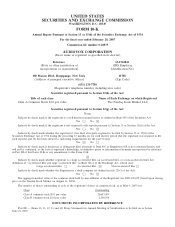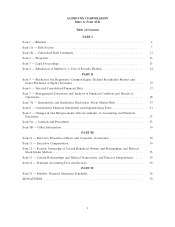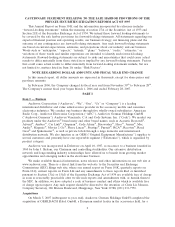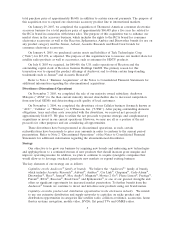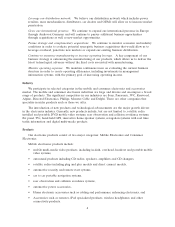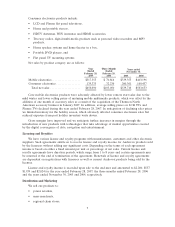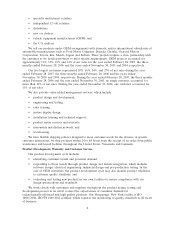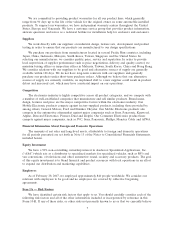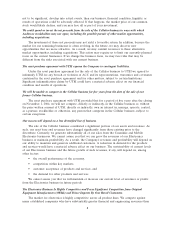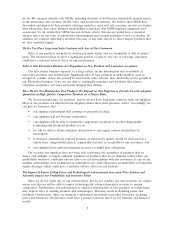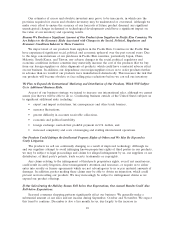Audiovox 2006 Annual Report Download - page 9
Download and view the complete annual report
Please find page 9 of the 2006 Audiovox annual report below. You can navigate through the pages in the report by either clicking on the pages listed below, or by using the keyword search tool below to find specific information within the annual report.not to be significant, develop into actual events, then our business, financial condition, liquidity, or
results of operations could be adversely affected. If that happens, the market price of our common
stock would likely decline, and you may lose all or part of your investment.
We could spend or invest the net proceeds from the sale of the Cellular business in ways with which
Audiovox stockholders may not agree, including the possible pursuit of other market opportunities,
including acquisitions.
The investment of these net proceeds may not yield a favorable return. In addition, because the
market for our remaining businesses is often evolving, in the future, we may discover new
opportunities that are more attractive. As a result, we may commit resources to these alternative
market opportunities, including acquisitions. This action may require us to limit our currently planned
focus on the current businesses. If we change the business focus, we may face risks that may be
different from the risks associated with our current business.
The asset purchase agreement with UTSI exposes the Company to contingent liabilities.
Under the asset purchase agreement for the sale of the Cellular business to UTSI we agreed to
indemnify UTSI for any breach or violation of ACC and its representations, warranties and covenants
contained in the asset purchase agreement and for other matters, subject to certain limitations.
Significant indemnification claims by UTSI could have a material adverse effect on our financial
condition and results of operations.
We will be unable to compete in the Cellular business for five years from the date of the sale of our
former Cellular business.
The asset purchase agreement with UTSI provided that for a period of five years after the closing
on November 1, 2004, we will not compete, directly or indirectly, in the Cellular business or, without
the prior written consent of UTSI, directly or indirectly, own an interest in, manage, operate, control,
as a partner, stockholder or otherwise, any person that competes in the Cellular business, subject to
certain exceptions.
Our success will depend on a less diversified line of business.
The sale of the Cellular business constituted a significant portion of our assets and revenues. As
such, our asset base and revenues have changed significantly from those existing prior to the
divestiture. Currently, we generate substantially all of our sales from the Consumer and Mobile
Electronics businesses. We cannot assure you that we can grow the revenues of our Electronics
business or maintain profitability. As a result, the Company’s revenues and profitability will depend on
our ability to maintain and generate additional customers. A reduction in demand for the products
and services would have a material adverse effect on our business. The sustainability of current levels
of our Electronics business and the future growth of such revenues, if any, will depend on, among
other factors:
• the overall performance of the economy,
• competition within key markets,
• customer acceptance of products and services, and
• the demand for other products and services.
We cannot assure you that we will maintain or increase our current level of revenues or profits
from the Electronics business in future periods.
The Electronics Business Is Highly Competitive and Faces Significant Competition from Original
Equipment Manufacturers (OEMs) and Direct Imports By Our Retail Customers.
The market for electronics is highly competitive across all product lines. We compete against
many established companies who have substantially greater financial and engineering resources than
8

